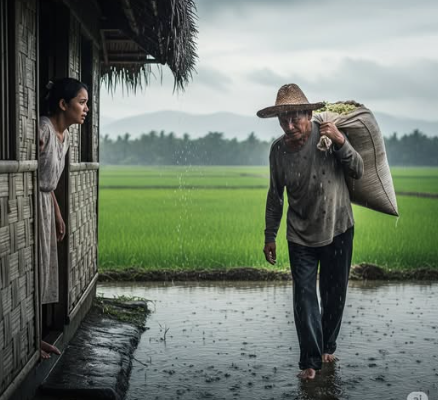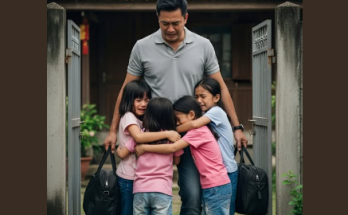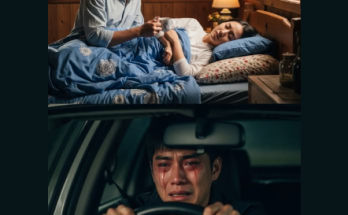My name is Nandini, 35 years old, I am a primary school teacher in a village in the lap of the Himalayas in Uttarakhand. Life goes smoothly like any other woman, that’s all… I’m still single. It’s not that I’m too picky or don’t believe in love, it’s just that my luck hasn’t come yet. My mother often sighed when she saw me; My friends are either busy with their children or have gone to Delhi to earn a living. I feel like a slow-growing tree in the middle of the forest that has entered its budding period.
The weather turned stormy that afternoon. I was cycling home from school when it started raining heavily. Luckily, I was just two kilometres away from home; There was a makeshift hut on the side of the road that people had built to protect myself from the sun and rain while working in the fields, so I quickly stopped the car.
The wooden hut was old and water was dripping in some places, but still sturdy. I parked my bicycle, wiped cold drops of water from my face, and a reclined figure appeared toward me in the distance.
He was an old man. He was wearing a thin, torn raincoat; When I saw someone in the hut, his hazy eyes still sparkled.
I hesitated for a moment, then stepped away and called out:
“Come in and take shelter, it’s raining heavily!”
The old man folded his hands in thanksgiving, and went inside, trembling. As I approached, I noticed that he was slim and tired; The smell of mud was mingled with the stale smell of wet clothes. He sat on the edge of the hut, as if afraid of disturbing me.
I put my hand in my bag, pulled out a chapati sandwich and a carton of milk, which I often brought for students who didn’t want to eat:
“Please eat this to warm your stomach.” ”
He stared at me for a long time, his eyes strange—very emotional, as if he recognized something familiar. She stammered:
“You… They are very kind… Miss Nandini, isn’t it?”
I was shocked. How did you find out my name? I nodded cautiously:
“Do you know me?”
The old man smiled, ate a morsel of cake, and said in a choked voice:
“I… I knew your mother. “Decades ago, I was in the army with your father. I… I owe a lot to your family…
The rain was still incessant. This confused me. I had never heard my mother say anything like that.
My mother died when I was 20 years old. As far as my father is concerned… “I’ve never met him,” I said softly.
He nodded, his sunken eyes shining with tears:
— Yes… Because I was the one who saw the night they sacrificed themselves… In the mountains above Kargil, near Dras.
I was stunned.
When I was young, whenever my mother asked about my father, she would simply say: “Your father is gone forever.” “No pictures, no death certificates. Just an old wedding ring that they kept handy-handed in a wooden box.
The old man said softly:
“On that day, my detachment and your father were guarding the same high place. When the enemy’s guns suddenly started firing, they pushed me into the bunker, and they… Suffered the full impact of the shrapnel. When I woke up, he was lying motionless, his sweater smeared with blood.
He paused, took out a small thing wrapped in old cloth from his shirt, and gave it to me:
I’ve kept it for decades. It was theirs, and they told me to bring it back to your mother… But I didn’t have the courage… I didn’t dare to face the people standing behind.
I opened it with trembling hands: a faint letter, and a photograph of us—my young mother, standing next to a tall man in military uniform, smiling and giggling. That smile… I’ve been looking at him in the mirror for 35 years.
I burst into tears.
The rain gradually stopped. The air brought back the scent of mulch and a part of the past.
The old man looked at me and said softly:
Will you take me to your house? I just… I want to do what I have to do.
I nodded.
…
The little house where I had lived alone for more than ten years was suddenly filled with warmth by the sound of different footsteps and the old man’s slow breathing. After eating a simple meal, I made hot tea and invited them to sit down and talk. The letter and picture were still on the table. I looked at him, then at him, my heart full of questions.
What did you do after the war?
I roamed everywhere, with no relatives left. It’s like living the remaining years of someone who should have died in the mountains. The old man smiled sadly. I collect junk, I work as a labourer. I also intended to find him and his mother… But I was a coward. I thought she would be annoyed when I came back, but she didn’t.
— What’s your name?
I am Mohan. The unit used to call me Mohan “Silver Beard”, because I was a year older than my brothers and was always worried about the future.
Looking into Mohan’s eyes, I didn’t feel strange anymore. There was something very familiar—like a lost piece of my family.
A few days later, I bought her new clothes, took her to a haircut, and cleaned the empty room. He became so emotional that he almost cried while eating hot food at home.
One morning, he quietly handed me a bundle of old papers: a notebook with detailed notes on the battlefield, the names of his martyred comrades, and a thick line: “Arvind Rana – martyred on the high ground near Dras.” I send letters and photographs to relatives. ”
I choked up. My mother never said that. But now I knew: it was my father.
Mohan said:
— At that time, we had only time to temporarily bury him on the mountain and then change the place. Many years later, a monument was erected there. If you want… I can take you to Kargil, the war memorial at Dras, and then to that old high ground.
My eyes filled with tears. After living in seclusion for so many years, I never thought that I would get a chance to know about my father.
…
A month later, I asked for leave and went to Ladakh with Mohan. That journey proved to be a turning point in my life.
At the Kargil War Memorial in Dras, with the help of old unit records brought by fellow soldiers and Mohan, we found my father’s name inscribed on a pink stone slab amidst strong mountain winds. I folded my hands, garlanded the marigold flowers, and whispered:
— I’m here, father…
Later in the afternoon, we walked through the stone path to the hill where Mohan had described the bunker as it used to be. The sky behind the Tololing peak was purple. Pointing to a top of thatch, he said:
“We built a stone mound there… In the snowy season, everything changed, but that place… I’ll never forget.
I got down on my knees, picked up some small stones, decorated them in a simple stone temple, and put the incense I had brought from home into it. A cold breeze was blowing, smoke from incense sticks mingled with each other. Mohan stood behind him, silently wiping away his tears. I knew that at that moment, he was not only my father’s companion, but also the keeper of memories—a part of history, a part of my family.
When I returned, he took Mohan to stay with me. I used to call him “Grandpa.” In the evenings, I used to teach the children of the village, he would sit on the verandah and tell stories of the mountains and forests, stories of soldiers who knew how to give their lives for each other. In that tiny house in Madhya Pradesh, for the first time in many years, I felt I was no longer alone.
I may not have met my spouse, but I had refound my roots—my father’s name, the place where he lay, and an old man whose honest eyes were like those of people who don’t turn their backs on the past. And I see: Sometimes, a sudden rain is enough to turn life on a new path—a path with family, memories, and peace.



